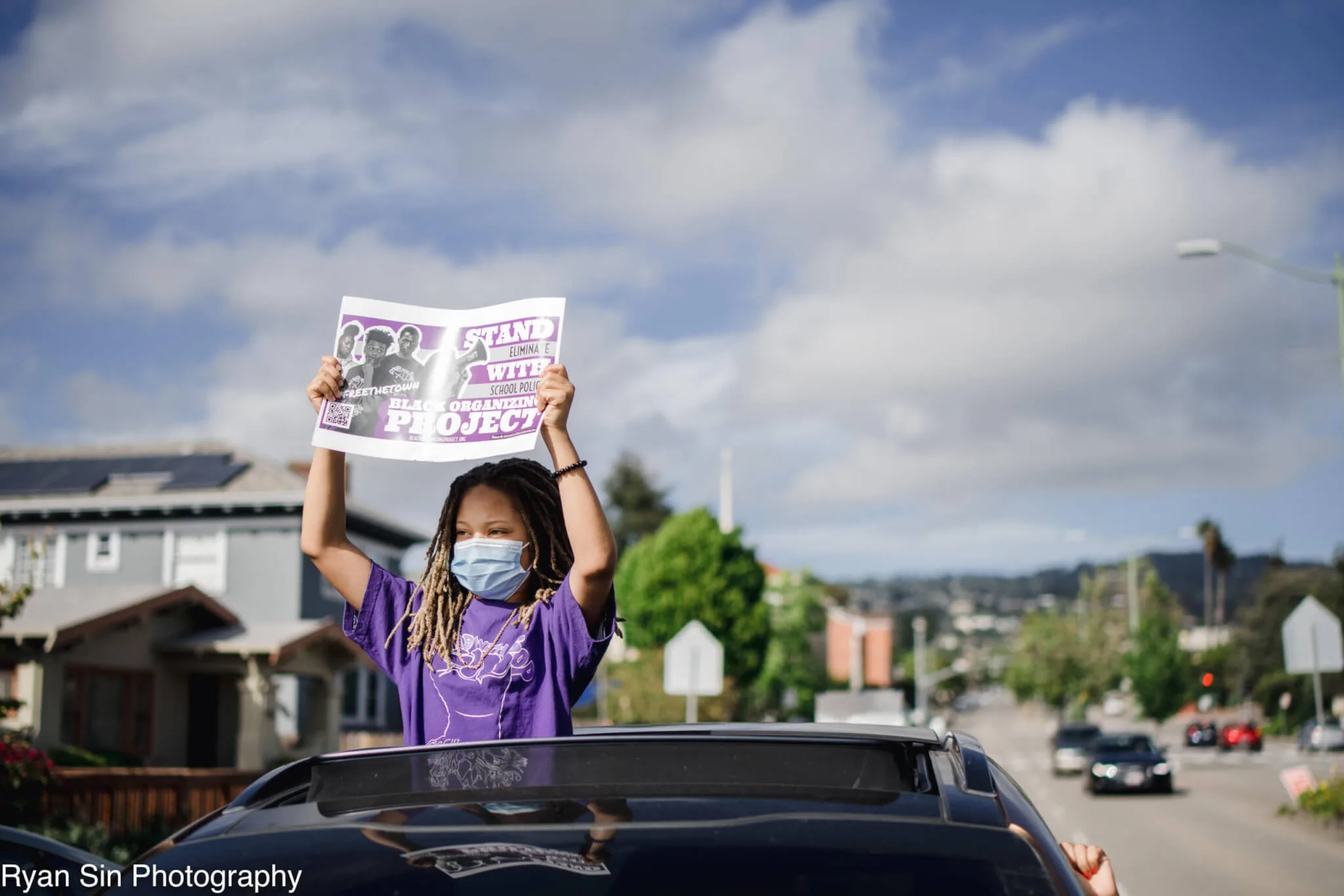
Black Organizing Project Youth Leader Imani Snodgrass advocating for equal rights during their car caravan in early June. Community members visited the homes of Oakland school board members to urge them to support removing police from schools. (Photo courtesy of Ryan Sin Photography/Black Organizing Project)
The Phoenix Union High School District is considering ending its contract to have police officers on campus.
School resource officers were intended to provide students a sense of safety, but George Floyd’s killing at the hands of police has amplified long-standing criticism that police presence in schools has criminalized students of color.
Nearly 45% of American public schools have at least one part-time school resource officer, and many who are pushing for reform say the officers disproportionately target students of color. Such calls have grown following the May 25 killing of Floyd by a Minneapolis police officer, as protests across the country have demanded the restructuring of police departments and the reallocation of funds to social-justice purposes.
The issue was highlighted last October, when a group of west Phoenix middle school students was pepper sprayed by a school resource officer and an 11-year-old girl was handcuffed. Many critics called for the officer’s removal from the school, The Arizona Republic reported.
Activists in Phoenix are petitioning school districts to end contracts with police departments, who assign officers to schools. In Los Angeles and Oakland, activists are working to eliminate entire school police departments.
On June 2, the Minneapolis School District unanimously voted to end its contract with the city’s police department. The Denver Public Schools Board of Education made a similar decision on June 11.
Cops for hire
The first documented school resource officer – or SRO – was in Michigan in 1953. Throughout the 1970s and 1980s, more schools began to hire SROs to “follow up on crimes that either occurred on school property or involved a student,” according to the International Foundation for Protection Officers.
In the decades since, a troubling trend of racial disparities faced by Black students has emerged, according to the 2013-14 Civil Rights Data Collection. Compared with white students, Black students were found to be 2.2 times more likely to “receive a referral to law enforcement or be subject to a school-related arrest.”
“This is a fight for humanity,” said Jessica Black, organizing director of the Black Organizing Project, which was founded in Oakland in 2009. “We are literally fighting and have been fighting all these years for people to see our children as children, not as adults, not as criminals and not as animals, as some folks have described our children.”
Removing officers from schools
Los Angeles has the largest school police department in the country, and leaders of the teachers union there voted overwhelmingly to recommend removing officers. The Los Angeles Board of Education considered the decision June 23 but did not come to an agreement. Instead, a task force created by the district’s superintendent, Austin Beutner, will handle reform, the Los Angeles Times reported.
The Phoenix Union High School District Governing Board has postponed a decision to renew its contract with the Phoenix Police Department, which supplies nine officers for schools in the district. The board’s next scheduled meeting will be held Aug. 6.
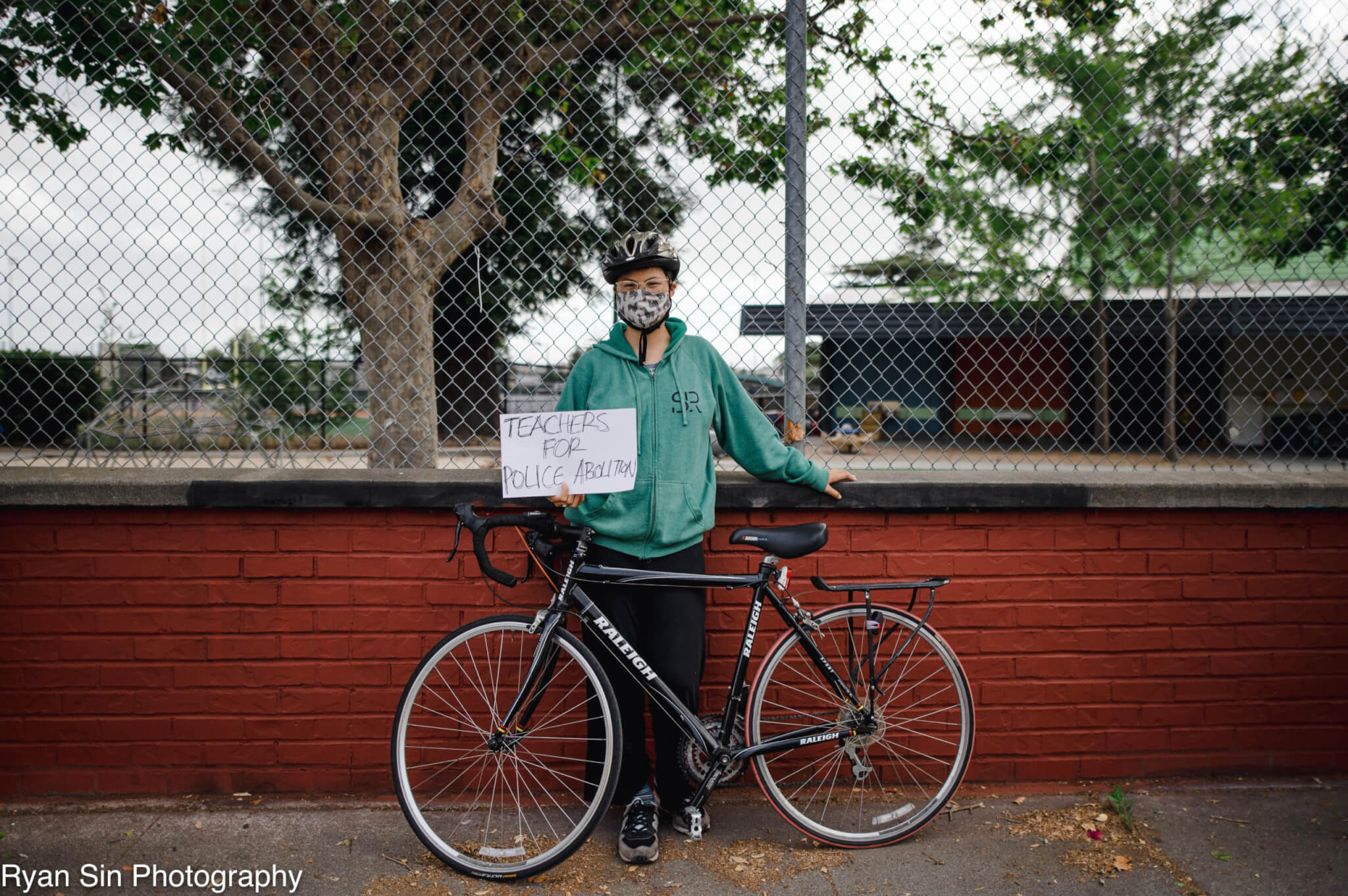
Stephanie Parra, the board president, announced the postponement in a series of tweets on May 31, stating, “We do not know what the future holds for SROs in Phoenix Union, but I guarantee it will continue to be grounded in protecting and serving all of our youth and families.”
On June 24, the Oakland School Board voted unanimously to eliminate the district’s school police department.
“As we are moving to eliminate police out of school,” Black said, “it is important because that’s an action towards the injustices that have been imposed on the Black community. It is a symbolism of what is possible when you actually see value in people, when you see Black people as valuable human beings.”
A decade-long effort
As a grassroots community group, Black Organizing Project works toward racial, social and economic justice. It has been fighting over a decade to remove resource officers from schools.
“The voices of the people have gone unheard for too long, and so now we’re seeing an uprising of these voices that have been unheard,” Black said.
Exactly how many SROs are in schools in the U.S. isn’t known, as they are not required to register with a national database, and police departments and schools are not required to report how many officers currently are working.
However, the National Association of School Resource Officers estimates there are 14,000 to 20,000 officers working in the United States. In 2018, The Arizona Republic found there were 165 full-time officers in Phoenix public schools.
Kevin Quinn, the president of the Arizona School Resource Officers Association, said the officers “are not meant to assist principals in school discipline.”
“I think the first part of reform we need to worry about is getting the school staff and the administration and the teachers on board and understanding what is that exact role,” he said. “You should never be involved in school disciplinary issues or things that aren’t criminal.”
Quinn, who worked as an SRO for 15 years in Arizona, said it is important to have officers on campus to reduce police response time, such as in cases of school shootings.
“Let’s say a school shooting where there isn’t an officer on campus, where there is no SRO,” he said. “You’re looking at a minimum of three to five minutes response time, on a good day, to get patrol officers responding. If there is an SRO on campus, your police response time to that incident is zero, they’re already there.”
Criminalization of youth of color
From the time of the 1965 Watts Uprising until present day, residents of South Los Angeles have reported over-policing and lack of resources for young people in the largely Black and Latino neighborhoods.
“Schools have always been places of social control,” said Maisie Chin, the executive director and co-founder of CADRE, Community Asset Development Redefining Education, in South Los Angeles.
“The minute that they were open to everybody, they automatically became places of social control for low income communities of color, especially Black communities, and so policing, security, safety started to become needed in certain schools.”
Chin’s organization, founded in 2001, is led by Black and Latino parents from South Los Angeles whose children attend school in the Los Angeles Unified School District. She says her community pays a price for misplaced fears.
“Then after Columbine, ironically which did not happen in a Black or brown school, it was really just the school shootings that unfortunately justified almost a militarized presence of law enforcement in schools,” Chin said.
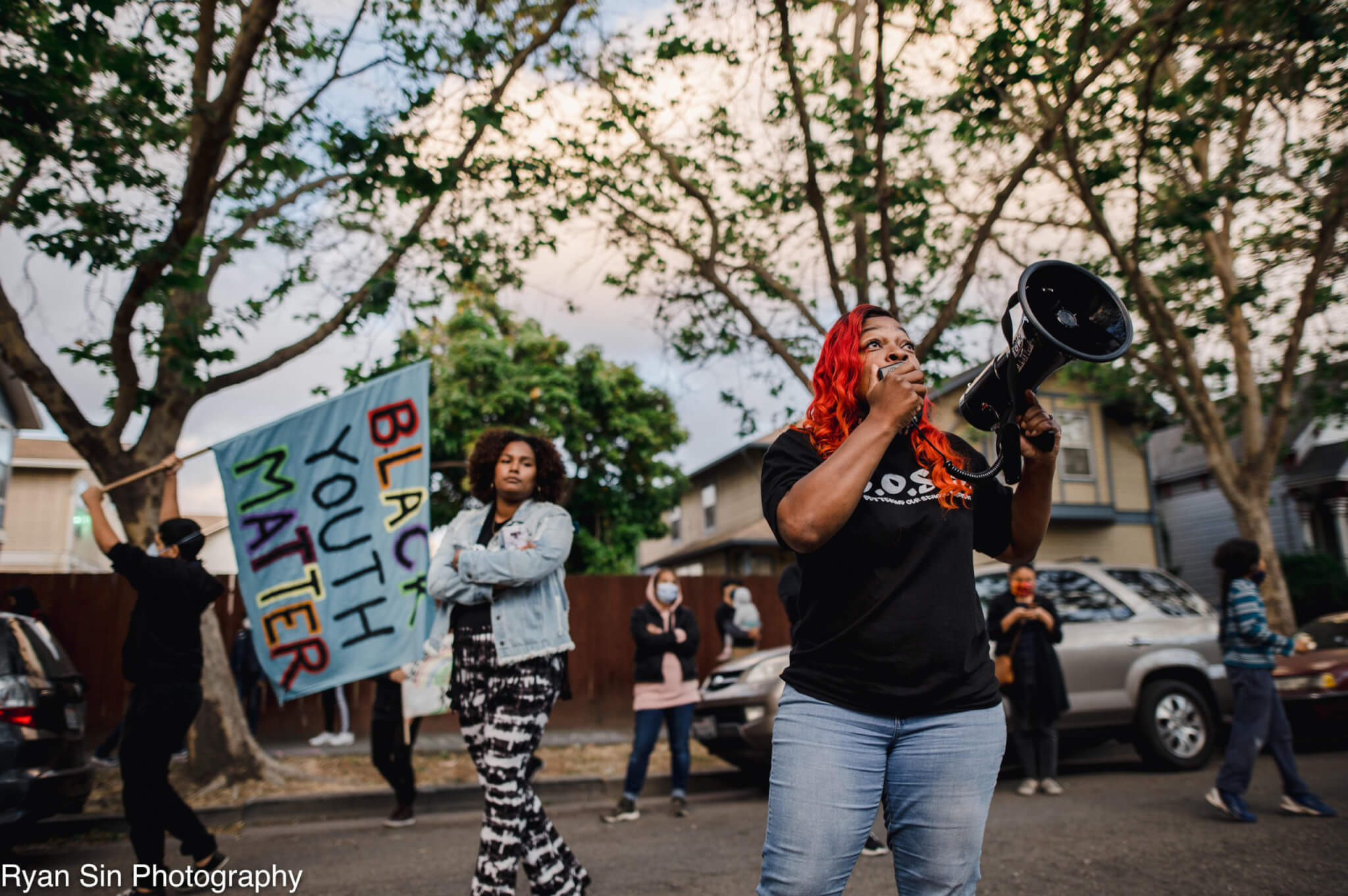
Punishment, not protection
There have been cases where a police officer on campus did not prevent a school shooting, such as the 2018 mass shooting at Marjory Stoneman Douglas High School in Parkland, Florida. The armed sheriff’s deputy was widely criticized after he “retreated to a position of safety” during the shooting, The New York Times reported.
Many who are calling for the removal of school police officers often cite the connection to the “school-to-prison pipeline.”
“The school-to-prison or deportation pipeline is a system where students of color are usually the ones affected by schools with a lack of funding,” said Michelle Ruiz, a youth organizer with the Phoenix group Puente Youth Movement, which is part of the Puente Human Rights Movement.
“Most of the time, it’s not teachers or principals dealing with the discipline, and it leads to an SRO or cop interacting with them and leads to students eventually getting detained.”
Ending the school-to-prison pipeline
Abia Khan, a recent graduate of North High School in central Phoenix, started a petition urging the Phoenix Union School District to terminate its contract with Phoenix police.
“A lot of administrators, especially in Phoenix Union, especially at North, sometimes they get overwhelmed with disciplinary cases and they hand them off to the SROs, and SROs report to the police chief, not the district,” Khan said. “Sometimes kids might have minor offenses and then they’ll get trumped up charges.”
The school-to-prison pipeline, a term describing the process by which over-policing minority youth begins them on a path to incarceration, often disproportionately affects students of color, students with disabilities, and students with a history of poverty or abuse, according to the American Civil Liberties Union.
“When you think about the school-to-prison pipeline as students are being arrested in school, for things like a fight, what happens to peer-to-peer mediation?” Black said. “What happens to teaching social skills? What happens to conflict resolution?”
Politics
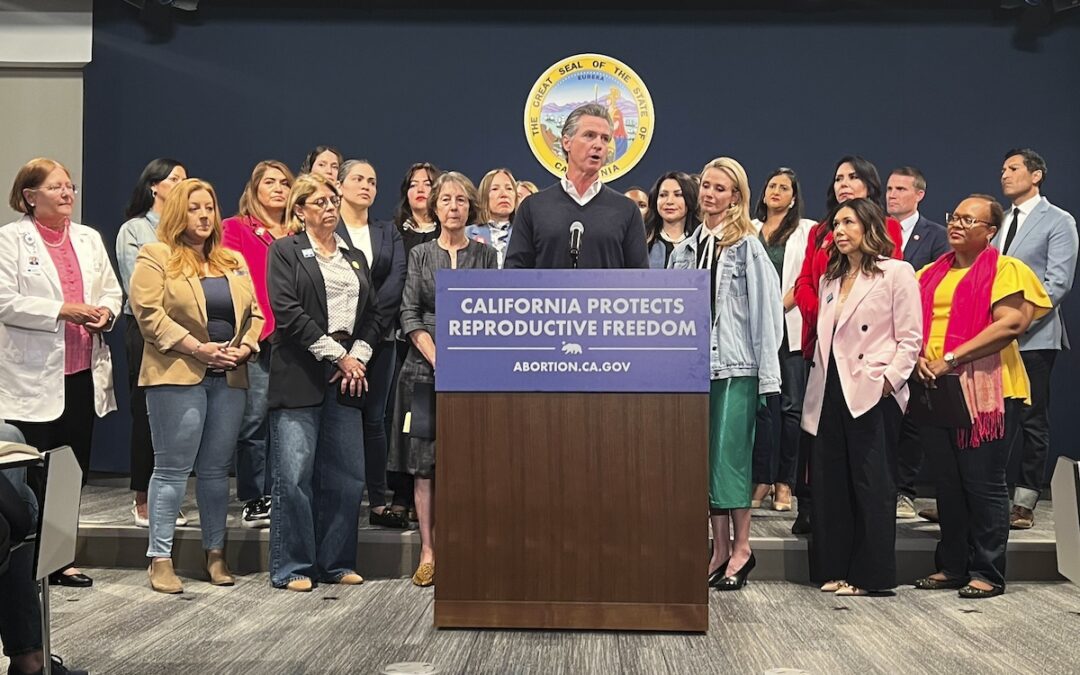
Gov. Gavin Newsom wants to let Arizona doctors provide abortions in California
California law generally allows abortion up to the point of fetal viability, which is around 24 weeks. SACRAMENTO, Calif. (AP) — Arizona doctors...

VIDEO: Arizona Attorney General Kris Mayes indicts 18 ‘fake electors’
@coppercourier An Arizona grand jury has indicted former President Donald Trump's chief of staff, Mark Meadows, lawyer Rudy Giuliani, and 16...
Local News

Escape the heat at these indoor pools in Tucson
Arizona: it's synonymous with sunny. Mix that sun with the sprawling urban blacktops and the result is the nationally recognized heat that is...
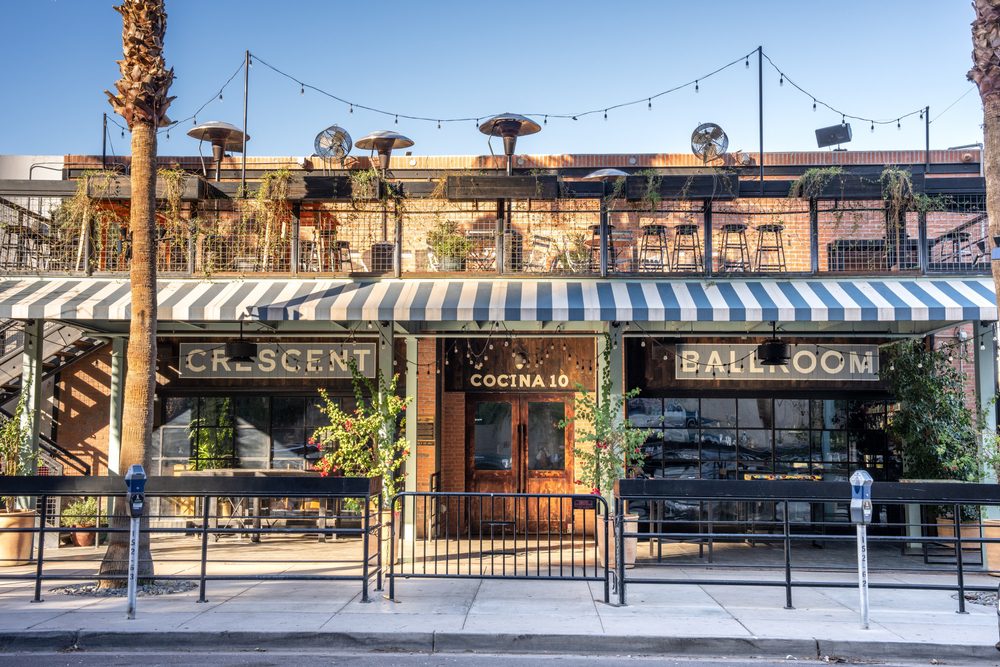
We asked, you answered: 7 music venues in Arizona for a more intimate show
The biggest artists in the world come to Arizona to perform at places like Footprint Center, State Farm Stadium, and Desert Diamond Arena. But what...




